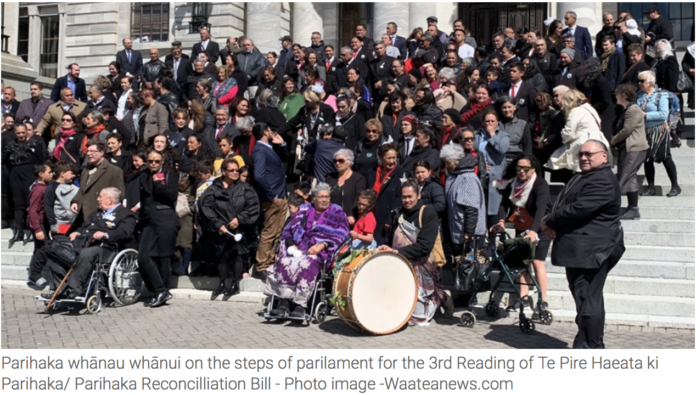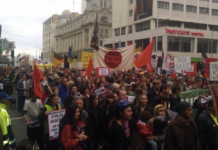We must never allow the perfect to defeat the good, but the fact that it’s taken 138 years to formally apologise for the tragedy of Parihaka speaks volumes about the cultural denial of the negative effects of colonialism.
The secret to New Zealand’s economic success over its barely 200 year life has been the illegal seizure of indigenous lands and point blank refusal to hand them back or pay genuine compensation for their theft.
Māori lost 95% of their land in less than a century, the economic, cultural and political legacy of that level of theft is seen today in every negative social, education and health statistic we have.
Settling the Treaty is a Pakeha desire so that they can drop the pretense of solving that legacy, where as honouring the Treaty requires an engaged partnership and real understanding.
The Treaty settlement process to date has been a farce that has only succeeded in exacerbating and entrenching the injustice of the original confiscation, so what needs to happen now?
I am a big believer in the Treaty and a big believer in Constitution. If we are serious about righting the wrongs of our colonial past so that Māori have the same agency promised to them under the Treaty, we must consider political structural change with an Upper House created within Parliament that has 50-50 Pakeha and Māori representation.
This Upper House would consider law from the perspective of its Treaty obligations and reject legislation back down to the House of Representatives if that law didn’t reach that standard.
Tinkering and flawed processes have done nothing to bring justice in 138 years since Parihaka, that is what the Government should truly be apologising for.
First published on Waatea News.







As long as there are commentators like Nelson’s Amy Brooke, formerly Agnes-Mary Brooke, chipping away
like a te peke rakau at everything Maori, then there’s a pernicious anti-Maori undercurrent meanly festering, and ignorant, or not caring, about the realities of history.
Why she publishes this bilge in overseas publications, is a bit odd – unless it’s for the money. Does she think that Australian readers of The Spectator will all rise up on the side of white NZ’ers ? Not likely – this is Amy
being Amy, per usual.
As the wife of a medical practitioner, and as somebody who has spent little time out in the paid workforce, Amy Brooke is, I suggest, unacquainted with the dynamics of the lives of people who sometimes don’t have money for shoes for their children, or money to heat their rented homes, year after year after year, and this sometimes due to the vagaries of a history imposed on them in a way which the civilised among us know to be unconscionable.
https://www.spectator.co.uk/2019/10/made-up-maori/
A constitutional change to establish an upper house may not necessarily be the best way of honouring the Treaty, and if Brooke is representative of the well-heeled half-educated Pakeha middle-class who object to Waitangi Tribunal settlements per se, it will be seen as divisive – which it will be.
Snow White: “…Nelson’s Amy Brooke, formerly Agnes-Mary Brooke…”
Her profile in NZ nowadays is so low as to be subterranean. In truth, I doubt it has ever been particularly high, even when her column was syndicated, back in the late 80s – early 90s. My impression is that she’s always been a bit abrasive, tending to fall out with people who might otherwise have been supportive of her views. She won’t be having any kind of influence here, I’d guess.
“…chipping away like a te peke rakau at everything Maori…”
D’Esterre – AB was contributing to Investigate Magazine (I don’t know if it still exists) and publishes her own children’s books and other people’s books; and Wishart’s company, published her book, The 100 Days. In it she is anti-Islam, but possibly unaware that there are more forms of Islam, than Christianity. She also argues for abolishing the Treaty – vigorously argues anti-Maori on all Maori issues I think – it’s not indexed, and others may be more interested in tackling it than I – I dipped.
The book reads as if it may be a compendium of old columns, but I think without the benefit of the late Frank Haden’s sub-editing. There are things in it which I think plain wrong e.g. that the govt obliged mothers to use Plunket’s services, and an horrific allegation against Plunket, which I won’t repeat.
She writes much with which I would not agree, including, ” Nowadays lesbian and homosexual teachers are ready to pounce to indoctrinate vulnerable teenagers via gay support groups at schools,” and I have to be careful here, as I cannot afford costly litigation. Her brother told me a few years back that she disputed a fairly minor-type traffic infringement with a woman police or MOT person, hired a top Wgtn barrister to take it to court, and won at a personal cost of $16,000.
This is an elegant example of the gulf which exists between people with money, and those without – the rest of us would gulp, and pay up for small traffic stuff, but many cannot afford to do that – an unexpected demand upon an empty purse can precipitate a major family crisis; $16,000 could buy more than enough instant noodles to feed a family for a year.
I am not anti-homosexual; I don’t care that Helen Clark is childless – or that Ardern isn’t; I don’t mind whether Sue Bradford is Marxist or Socialist and welcomed her anti-smacking bill; I like Noam Chomsky, am ok with Che Guevara (and have Jon Anderson’s v long definitive book on him), and don’t think that this country will suffer through not believing in the virgin birth. However, the Treaty stays, and whatever wrinkles may occur in it’s implementing, they must be addressed, and will be, with patience required from all parties, and hopefully with no more unhelpful judgmental labelling of the undeserving. (Hint hint Greens.)
Snow White: “However, the Treaty stays….”
I used to think that, too, back in the 1970s and 8os. But: the more years have elapsed since then, and the more NZ society has changed, the less certain I am about the place of the Treaty, or what implementing it actually means. Here’s Elizabeth Rata’s take on it:
https://www.nzherald.co.nz/opinion/news/article.cfm?c_id=466&objectid=10853668
She encapsulates my view on the issue nowadays. I think that many NZers share a similar perspective.
Snow White: “….Nelson’s Amy Brooke, formerly Agnes-Mary Brooke….”
Nowadays, her profile is so low as to be subterranean; in truth I doubt that it was ever particularly high, even in the days when she had a column in the Press.
“….chipping away like a te peke rakau at everything Maori…”
She’s certainly had a bee in her bonnet for many years about taha Maori. As the wife of a GP, I’d have thought that she’d have been privy to the hardscrabble side of life that is, in general, the lot of the poor. But then, she lives in the Nelson area. I was born near there; pakeha settlement came very early, and I’ve got the impression over the years that the descendants of the original settlers have a negative view of Maori. This may be driven by memories of the Wairau Massacre being handed down from generation to generation.
While I don’t doubt that some citizens who aren’t Maori share her views, my impression (admittedly this is anecdotal) is that most don’t. If their family is intermarried (as is my extended family), they’ll have an opinion formed by experience; otherwise, it seems to me that they know little and generally care less. They aren’t negative, just not interested. Many Maori no doubt feel the same about pakeha, if they don’t have regular interaction.
“Why she publishes this bilge in overseas publications, is a bit odd…”
Probably because nobody in NZ will publish her. I read that Spectator piece: it fairly represents her views, hostile as they are. But – all other things being equal – I fail to see why she couldn’t get it published here. Free speech and all that: she’s at liberty to hold any opinion she likes, and if she were to be published here, it would provide the opportunity for people to challenge her. It isn’t until I look at an article like this of hers that I realise the extent to which public discourse here is censored. Not only does it dumb down such debate as there might be, it’s potentially dangerous.
“…if Brooke is representative of the well-heeled half-educated Pakeha middle-class who object to Waitangi Tribunal settlements per se…”
She may be, but I doubt that, to be honest, from what I’ve heard. Though I have picked up a note of impatience among the middle classes, given the history of Treaty settlements and the fact that their benefits haven’t percolated down to the poorest Maori. And they can read: they see the education, healthcare and crime stats. Once upon a time, I agreed with those who claimed that Maori needed a separate education system: discrimination based on skin colour and so on. However, the arrival of waves of non-English-speaking migrants, whose children by and large did well in school, changed my mind. And in truth, middle class Maori had always performed well in education: I went to school and uni with them. And the same is true of healthcare: I worked in that system for many years, had my eyes thoroughly opened to the realities.
“A constitutional change to establish an upper house…”
I’ve always favoured a return to the upper house system, as we used to have. But I most emphatically don’t favour appointments to it.
If we were to have an upper house, we must elect those who sit in it. I doubt that many citizens (many Maori included) would want a quota for Maori; in the modern world, which we now inhabit, quotas of that sort bespeak segregation – and, technically, racism. My generation fought against segregation in various other polities: it would be bizarre indeed, were we to find that sort of system instituted in our own polity.
Bomber
If you wish to right the wrongs of Maori land confiscation as a white privileged male you can start by giving your local Iwi your house.
Stephen – You just don’t get it do you. Just because Bradbury is a person of a certain colour, doesn’t mean that he is privileged- that is a nonsensical racist assumption. We need to start using language a little more accurately here, instead of gaslighting people.
We have moved on from colonial times, and we now live in post-colonial times.We are post-colonialists.
As post-colonialists we function under a different framework of mores, rules, and laws from those which governed society in the past. The most obvious of this is the establishment of the Waitangi Tribunal, and the recognition of the principles of the Treaty in legislation. This needs to be done within a framework known by and acceptable to all parties, and by and large it is – albeit not always smoothly.
However commendable it may be for Martyn to give his house to the local iwi, I doubt that he had it handed to him on a gilded platter, and giving it away may solve others’ problems, but create problems for him and his family, i.e. swapping one set of problems for another. Back to square one. Not the best way to go.
And what about the land Maori swiped from each other ? Want to track all that down too, and ask the current occupiers to vamoose ?
The scandalous shortage of housing in NZ, is a convenient way to illustrate the huge and growing gap between the haves and the have nots, but it was not always this way in this country. This has happened in my adulthood.
Whatever past injustices that we all accept and agree need to be addressed, homelessness is, I suggest, directly due to government policy, and in particular, to the years of National misrule when they disposed of houses, and blatantly lied and lied about any housing crisis even existing.
They helped create an underclass of people who cannot afford to buy homes, or to even rent them without taxpayer subsidies. In doing so the National Party were reverting to the colonial mentality which belongs to history, and they should all be consigned to history too. They knew exactly what they were doing, and Bridges has 30 odd people advising him how to keep people down. This gives the little swine a visible group to scapegoat to unthinking middle New Zealand, as bludging off the tax payer, and he has already started kicking people while they’re down, because they are such easy targets. This is barbarism, and should be called out as such.
‘Smiles of a Summer Night’ was a great Ingmar Bergman film. But as a political philosophy it does not actually work, and if Labour is able to accept that a small country with big inequalities is a fool-hardy basis for any healthy and fair society, then they have to produce a better narrative than Bridges and his henchpersons. That’s their job – theoretically.
We also need to accept that there will always be people who for one reason or another, depend on the rest of us to survive. I can say that, because I’m nobody; I’d appreciate it if any politician ever had the guts to say it too. Rather than Maori v Pakeha, it has to be all the people for all the people, despite the politicians, and despite the haters consumed by their jealousies.
Pip: “….Just because Bradbury is a person of a certain colour, doesn’t mean that he is privileged….”
In fairness to Stephen, I think that was a bit of a piss-take. As I recall, Martyn is among the authors on this blog-site who have in the past banged on about “white privilege”, as if the possession of white skin (whatever that means) automatically entails privilege. In a number of comment threads, I have been at pains to point out the inaccuracy of an assertion such as this.
That said, I completely agree with pretty much all of your comment: hear hear! A resounding blast of common sense on your part.
The exception is this business of the Treaty principles. It’s a slippery area: as people who are familiar with both Maori and English versions know, there is nothing of that sort in either one. The Treaty of Waitangi Act was passed into law in 1975, at a time of considerable unrest among young Maori in particular. Many of us who were adults then will remember what things were like then.
It wasn’t until 1986 (the SOE Act) that there was any mention in legislation of “principles”. And as I recall, no politicians could articulate what they were. If I remember rightly, it was Geoff Palmer who was responsible for the SOE Act; I don’t think that he was any better able than any other politician to tell us what he meant by “principles”. In the years since, an agreement of sorts has been arrived at. This is the Waitangi Tribunal”s take:
“….the Waitangi Tribunal must determine whether any Crown act or omission was or is inconsistent with the principles of the Treaty. Each Tribunal panel must determine not only whether the Crown has acted in breach of Treaty principles, but also which principles should apply to the claims before it.
For this reason, the Waitangi Tribunal does not have a single set of Treaty principles that are to be applied in assessing each claim. Over the years, however, some core principles have emerged from Tribunal reports, which have been applied to the varying circumstances raised by the claims.
These principles are often derived not just from the strict terms of the Treaty’s two texts, but also from the surrounding circumstances in which the Treaty agreement was entered into.”
https://waitangitribunal.govt.nz/treaty-of-waitangi/principles-of-the-treaty/
As you can see: even the Tribunal’s approach to them is – er – flexible. And that’s the problem with post facto insertion of this sort of thing: it means what people with the biggest axe to grind want it to mean. That isn’t really helpful to the rest of us citizens, most of whose ancestors didn’t arrive until long after the Treaty was signed. And those ancestors would have had no knowledge of the Treaty: likely didn’t even know of its existence.
‘We have moved on from colonial times ” not in towel ronger look at here council and not in mosgiel and parts of the south island racism is very much alive and festering.
Michelle: “….towel ronger…”
It looks as if you need a bit of a hand with your spelling (and possibly pronunciation) of Maori place names. I can help there: I learned te reo Maori back in the 1970s, when I was a young adult: I’m crash hot at spelling and pronunciation.
Comments are closed.